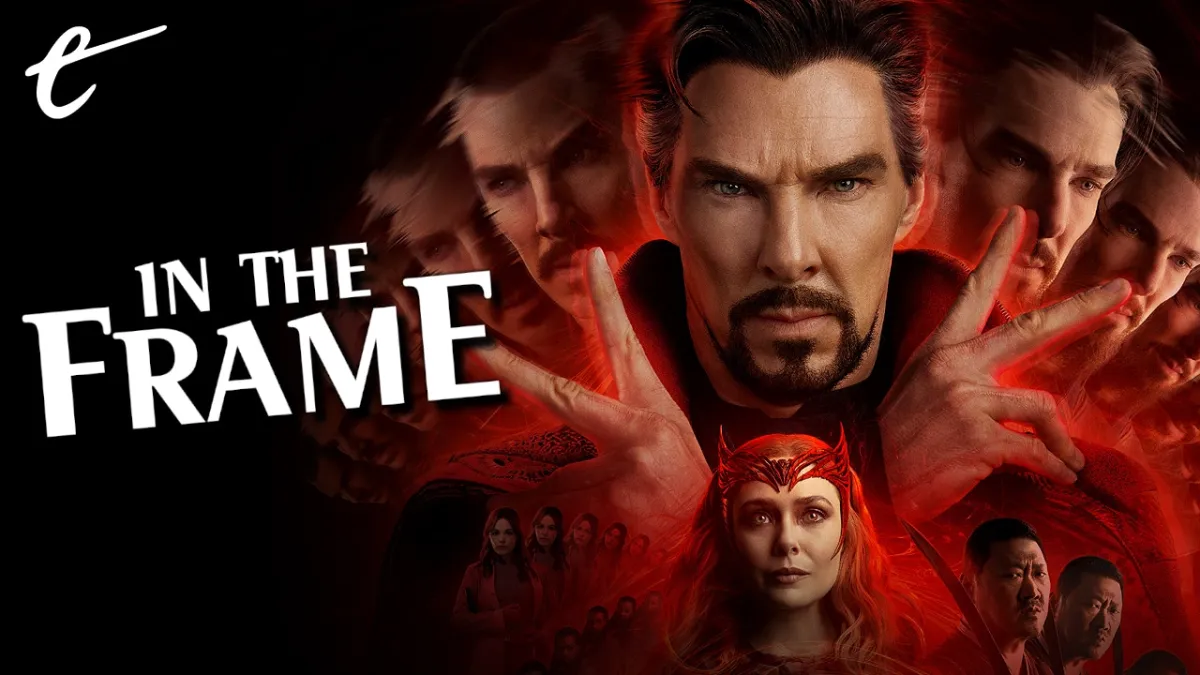This article contains spoilers for Doctor Strange in the Multiverse of Madness in its discussion of how the film deconstructs the typical power fantasy of the Marvel Cinematic Universe.
Doctor Strange in the Multiverse of Madness has some interesting things to say about superheroes, particularly as those superheroes exist within the Marvel Cinematic Universe.
In its early days, these films were often about the importance of humility accompanying great power. In Iron Man, Tony Stark (Robert Downey Jr.) learns to grow up and to take responsibility for the company that he inherited. In Thor, the title character (Chris Hemsworth) is banished to Earth until he can prove that he is “worthy” of the power of a god. In Captain America: The First Avenger, Erskine (Stanley Tucci) talks about the importance of Steve Rogers’ (Chris Evans) inherent goodness.
However, as the franchise evolved and ballooned, the scale inevitably escalated. These characters were no longer fighting villains in metal suits, semi-sentient weapons of mass destruction, or mad bombers. They were confronting existential threats. The heroes grew more powerful to confront them, and the movies grew increasingly accepting of the idea that such power should be held without consequence and without oversight.
When Stark created the genocidal artificial intelligence (James Spader) in Avengers: Age of Ultron, he faced no consequences for his actions. When Rogers refused oversight following the death of innocent civilians at the start of Captain America: Civil War, the audience was asked to side with him. It often seemed like self-doubt and introspection was their only weakness. Thanos (Josh Brolin) won in Avengers: Infinity War because the heroes wouldn’t “trade lives” to defeat him.

Wanda Maximoff (Elizabeth Olsen) is a case in point. She was an international terrorist in Age of Ultron, using her powers to prompt Stark to create Ultron and unleashing the Hulk (Mark Ruffalo) on the city of Johannesburg. At the end of the movie, Wanda is recruited in Rogers’ Avengers team. At the start of Civil War, it is Wanda’s miscalculation that leads to at least 11 civilian deaths, and the bulk of the movie is about how Wanda shouldn’t face any repercussions — even temporary house arrest.
After the events of Avengers: Endgame, Wanda enslaves the town of Westview in WandaVision. She crafts her own nostalgic domestic fantasy, pulled directly from classic sitcoms. At the end of the show, that fantasy is shattered. Once again, Wanda retreats without consequence, with the show treating her as the victim in all of this. Doctor Strange in the Multiverse of Madness picks up shortly after Endgame, and it is clear that Wanda has learned nothing from any of this.
Wanda is not in hiding. Stephen Strange (Benedict Cumberbatch) finds her easily enough. Like Monica Rambeau (Teyonah Parris) in WandaVision, Strange shrugs off Wanda’s treatment of Westview. To hear Strange tell it, Wanda’s heroism was “never in doubt.” Indeed, Strange is eager to be part of Wanda’s image rehabilitation, promising to get her “back on the lunch box.” After all, what Wanda did to Westview was monstrous, but it isn’t unusual for these superheroes.
In this shared universe, superheroes are constantly and uncritically bending reality to their whims. While the Hulk has traditionally been treated as something to be feared and controlled, Endgame finds Banner turning into the Hulk full-time to harness that power. The plot of Endgame finds the heroes gambling the fates of four universes to undo their mistake in Infinity War. Rogers even uses time travel, a fairly risky technology, to give himself a happy ending that he feels he is owed.

Even Strange himself is guilty of this sort of arrogance. The plot of Spider-Man: No Way Home hinges on Strange agreeing to use his powers to help Peter Parker (Tom Holland) get into Massachusetts Institute of Technology, one of the most prestigious institutions in the world. There is a frankly incredible level of arrogance involved in the assumption that Peter’s desire to go to a good college is enough to merit the rewriting of reality itself. This is part of a larger pattern of behavior.
Part of what makes Multiverse of Madness so compelling is that it is a movie explicitly engaging with and deconstructing this power fantasy. Wanda is very much the villain of Multiverse of Madness, but the truth is that she is simply doing what characters like Stark, Rogers, and Strange have been doing for years. She is using her powers to bend reality to her will, prioritizing her own desires and what she feels she is owed ahead of any larger debt to the community.
Multiverse of Madness acknowledges as much. Wanda repeatedly calls out Strange. “You break the rules and become a hero,” she chides Strange. “I do it and I become the enemy. That doesn’t seem fair.” Later, she calls him a “hypocrite” for trying to stop her, the same accusation that Kaecilius (Mads Mikkelsen) leveled at the Ancient One (Tilda Swinton) in the original Doctor Strange. She is not wrong, and part of the arc of Multiverse of Madness is acknowledging as much.
Much of the second act of Doctor Strange in the Multiverse of Madness is given over to a parallel universe governed by “the Illuminati.” While this is largely devoted to fan-pleasing cameos from actors like John Krasinski or Patrick Stewart, there is something of an edge to this. Much like their comic book counterparts, the Illuminati feels like an acerbic commentary on the superhero power fantasy: powerful people ruling the world from the shadows, their headquarters built as a monument to Ayn Rand.

The Illuminati is not so different from the heroes that Strange knows and respects. They also built a version of Ultron (Ross Marquand) and fought their own version of Infinity War. There are obvious analogues, with Captain Carter (Hayley Atwell) standing in for Captain America and Maria Rambeau (Lashana Lynch) replacing Carol Danvers (Brie Larson) as Captain Marvel. However, these heroes are a fascistic nightmare serving as judge, jury, and executioner.
Multiverse of Madness takes a surprising amount of pleasure in Wanda brutally dismantling the Illuminati, suggesting the destruction of a particular archetype of superhero power fantasy. There are moments when Multiverse of Madness appears genuinely subversive of the tropes of these sorts of stories. Strange spends the first two acts chasing a magical MacGuffin, the Book of Vishanti, which can give him “whatever (he) needs” to win, only to have Wanda destroy it in front of him.
The destruction of the Book of Vishanti effectively cuts off the obvious climax of a story like this, the ending to something like Endgame, where the heroes collect an item of untold power and use it to conveniently defeat the villain. Indeed, Multiverse of Madness plays as a criticism of the kind of superhero stories typified by Infinity War and Endgame. It rejects the stark utilitarianism and the “ends justify the means” logic that drive such stories, understanding the horrors they can excuse.
This is how Multiverse of Madness contrasts Strange and Wanda. The bulk of the movie finds Wanda and Strange fighting over multiversal refugee America Chavez (Xochitl Gomez), trying to take her power. The movie’s opening scene features an alternate version of Strange trying to kill America to harvest her ability to travel the multiverse, just like Wanda does. “You can’t control your power, but I can,” he reassures her. “It’s the only way.” He begins to monologue about her “sacrifice” but is killed mid-sentence.

Our version of Strange witnesses this scene as a dream. He then attends the wedding of his ex-girlfriend Christine Palmer (Rachel McAdams), who calls out his insistence on being “the one holding the knife.” His old surgical rival Nicodemus West (Michael Stuhlbarg) shares his own experience of “the Blip” between Infinity War and Endgame, suggesting how little “the world’s greatest surgeon and the world’s greatest superhero” has been paying attention to the suffering of ordinary people even as he shapes universes.
There has been some criticism of the portrayal of Wanda in Multiverse of Madness as “sexist,” as the story of a woman with great power who needs to be humbled. This reading ignores the movie’s more pointed commentary. Wanda is a white woman who has grown up absorbing fantasies of domesticity via television sitcoms and who has lived an extraordinary life of privilege as a superhero. She is willing to murder a young female immigrant to claim what she feels owed. It’s not subtle.
This is the key point of contrast between Strange and Wanda. The climax of the movie finds Strange surrendering “the knife.” He doesn’t defeat Wanda. He doesn’t take America’s power. Instead, he trusts America to use her own power. Wanda is brought back to reality when she is confronted with her alternate self, who seems to have completely rejected superheroism for a mundane life. Wanda is defeated by two women — and only when the male lead gets out of his own way.
In some ways, this feels fitting with director Sam Raimi’s Spider-Man trilogy, movies that were often about the idea that it was more important to be a good person than a great one. There is a refreshing sting and bite to Doctor Strange in the Multiverse of Madness, one that suggests a little self-awareness about the modern superhero genre as exemplified by the franchise. That’s the movie’s real magic.






Published: May 13, 2022 11:00 am